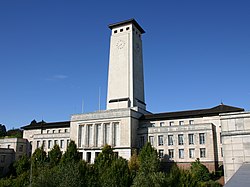Newport Civic Centre
| Newport Civic Centre | |
|---|---|
Canolfan Ddinesig Casnewydd | |
 The south elevation of the building | |
 | |
| General information | |
| Architectural style | Art Deco |
Listed Building – Grade II* | |
| Official name | Newport Civic Centre |
| Designated | 14 September 1999 |
| Reference no. | 22333 |
| Town or city | Newport |
| Country | United Kingdom |
| Coordinates | 51°35′19″N 3°00′22″W / 51.588713°N 3.006011°W |
| Construction started | 1937 |
| Completed | 1964 |
| Client | Newport Corporation |
| Design and construction | |
| Architect(s) | Thomas Cecil Howitt |
Newport Civic Centre (Welsh: Canolfan Ddinesig Casnewydd) is a municipal building in Godfrey Road in Newport, South Wales. The civic centre, which is the headquarters of Newport City Council, is a Grade II* Listed building.[1]
History

The first town hall, which was located in Commercial Street and designed in the classical style, was officially opened on 31 January 1843;[3] after this was found to be too small it was replaced a second structure, also in Commercial Street, which was designed by Thomas Meakin Lockwood in the Renaissance style and completed in 1885.[4][5] After deciding the second town hall was also inadequate for their needs, civic leaders chose to procure a new civic centre: the site they selected had previously been occupied by a property known as St Mary's Lodge in Fields Road.[6][7]
The ceremonial first sod on the new building was cut by King George VI, accompanied by Queen Elizabeth, on 14 July 1937.[1] Following a design competition, it was designed by Thomas Cecil Howitt in the Art Deco style and built using Portland stone.[8] Progress was delayed by the advent of the Second World War but resumed after the war: the building was fitted out, a collection of 12 murals by the German artist Hans Feibusch were installed and the clock tower was finished.[1] The building, which Newman in The Buildings of Wales described as "something of a disappointment", finally opened in 1964.[8]
The design involved a very wide symmetrical frontage with 37 bays facing Fields Road; the central section of five bays featured a huge full-height round-headed entrance on the ground floor and a clock tower above; there were wings to the east and west, each of seven bays, and beyond that there were side bays, each of nine bays.[1] A court complex was built to the south of the main building between 1989 and 1991.[1] Internally, the principal rooms were the council chamber and the mayor's parlour.[1] The building was the meeting place of Newport Borough Council until the town was granted formal city status as part of a contest for the Queen's Golden Jubilee in 2002 and the building then became the home of Newport City Council.[9]
A sandstone plaque to commemorate the 2010 Ryder Cup at the Celtic Manor Resort, which had been placed in the pavement outside the civic centre, was unveiled on 7 October 2011.[10] Works of art in the civic centre include a sculpture by David Evans depicting two straining miners entitled "Labour".[11]
References
- ^ a b c d e f Cadw. "Newport Civic Centre (22333)". National Historic Assets of Wales. Retrieved 15 April 2020.
- ^ "Now and then: Commercial Street, Newport". South Wales Argus. 9 June 2015. Retrieved 15 November 2020.
- ^ "Old Town Hall 1842 - 1883, Newport". Newport Past. Retrieved 29 September 2020.
- ^ Newman, John (2000). The Buildings of Wales: Gwent/Monmouthshire. Yale University Press. p. 442. ISBN 978-0300096309.
- ^ "Newport Town Hall Competition". The Builder. 8 July 1882. Retrieved 29 September 2020.
- ^ "St Mary's Lodge Field's Road". Newport Past. Retrieved 29 September 2020.
- ^ "Ordnance Survey Map". 1937. Retrieved 29 September 2020.
- ^ a b Newman, John (2000), The Buildings of Wales: Gwent/Monmouthshire, Yale University Press, p. 74, ISBN 978-0300096309
- ^ "Newport wins battle for city status". BBC News. 14 March 2002. Archived from the original on 14 March 2018. Retrieved 12 September 2019.
- ^ "Ryder Cup plaque unveiled". This is Newport. 8 October 2011. Retrieved 15 November 2020.
- ^ Newman, John (2000). The Buildings of Wales: Gwent/Monmouthshire. Yale University Press. p. 440. ISBN 978-0300096309.
External links
- Newport City Council
 Media related to Newport Civic Centre at Wikimedia Commons
Media related to Newport Civic Centre at Wikimedia Commons
